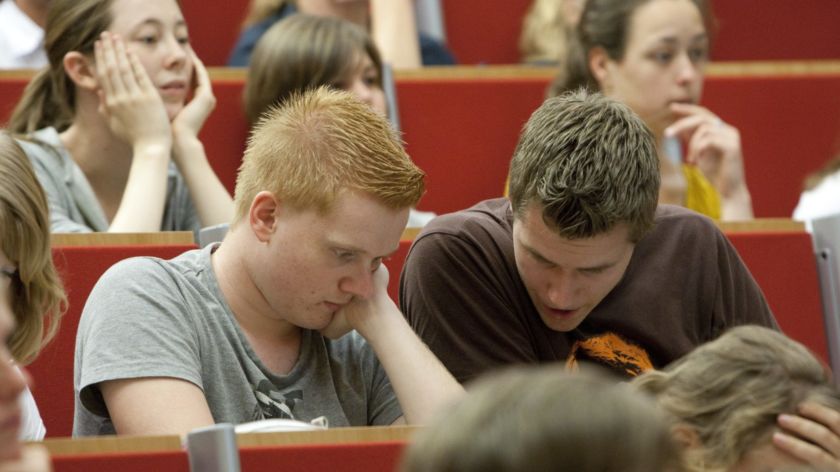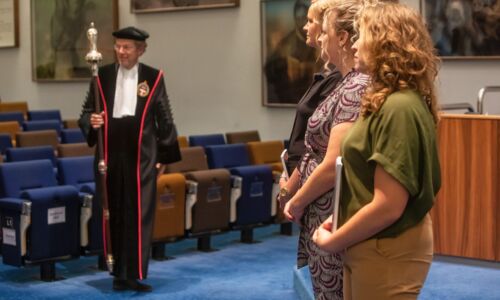Lecturer vs iPhone
-
 Studielast en nakijktijd problemen Foto: Dick van Aalst
Studielast en nakijktijd problemen Foto: Dick van Aalst
Thanks to the Internet and social media, today’s students are very easily distracted. As a lecturer, how can you keep your students’ attention? To adapt your teaching, or not? That is the question.
Hugo Meekes, lecturer in Thermodynamics notices it mostly during seminars. When his students are busy doing sums in groups. They can concentrate for a few minutes at most. Then they start chatting about something else, or they turn to their mobile phone. ‘Their attention span is very short. Which is a pity, because the ability to focus is an important precondition for studying.’ His impression is also that there is not much studying going on in the first place. If students don’t understand something, they expect Meekes to explain it to them. Like secondary school pupils. ‘We expect our students, when they don’t understand something, to search for answers on the Internet or in a book. But they don’t. They don’t independently look for answers when they don’t understand something.’
Meekes is concerned and recently sounded the alarm in a meeting at his faculty on teaching. It turns out other lecturers have also noticed the students’ concentration problems. They blame secondary education for feeding students information in bite-sized five to ten-minute stretches. But what can be done? Should we abolish traditional lectures altogether?
‘If our students can’t focus, we will have to teach them how to’
Of course not, says Meekes one week after the meeting in his room on the third floor of the Huygens building. Concentration, he says, is an academic quality. ‘If our students can’t focus, we will have to teach them how to.’
Visual information
On the other side of the campus, the teachers are worried too. Merel van Ommen, lecturer in Communication Science, is especially worried about student welfare. The University asks so much of her students, says Van Ommen, pointing to a growing overload. She believes the cause lies in teaching methods that no longer match the students’ experience. This prevents students engaging with the materials, and therefore also affects their attention level during lectures. ‘We may have to seriously reconsider the way we teach: does traditional oral transmission in lectures and seminars still meet the students’ needs, used as they are to quickly switching between media, with a preference for visual information?’
Knowledge clips
The Faculty of Law recently implemented a remarkable teaching innovation, one that really caters to the students’ preference for visual information. They introduced knowledge clips, short videos on a single theme, often an important ruling by judges in a court case. Niek Tönissen, who coordinates the knowledge clips, says these clips appeal to students more than having to read chapters from a book. ‘The current generation is used to videos and tutorials. We are simply following along in this development.’
The clips do not simply show a lecturer speaking against a white screen. Tönissen can add moving graphs, drawings, sound bites and videos. The Faculty of Law encourages students to watch the knowledge clips in preparation for the lecture. The clips can be found on Blackboard and last approximately six minutes. ‘We noticed that after six minutes, their attention wanes.’ The clips have been viewed 25,000 times so far.
‘Knowledge clips are an extra tool in preparing for live lectures and examinations’
Are such knowledge clips the bite-sized pieces required to keep the students’ attention? This was in any case not the intention behind them, says Dean of the Law Faculty Steven Bartels. The clips have nothing to do with the students’ potential concentration problems. On the contrary, the idea is for students to use the clips to prepare for lectures better, allowing lecturers to cover materials in more depth during the lecture. The clips give students a better understanding of complicated rulings and topics that previous generations of students found difficult to grasp. They also add colour and texture to legal problems.
The Faculty was simply looking for a way to increase the students’ understanding of the materials, says Bartels. ‘Knowledge clips are an extra tool in preparing for live lectures and examinations. We didn’t eliminate a single lecture. We are simply making use of tools that may not have been available to us twenty years ago, but that are available now.’
Popular
It cannot be denied that as a result of the Internet and social media, today’s students are much more easily distracted than those of twenty years ago. This probably explains the popularity of the web lectures offered in his study programme, says study advisor of Public Administration Nol Vermeulen. Web lectures allow students to follow a lecture whenever they want, making it easier to combine studying with other activities: friends, social media, parties, or a job on the side. ‘At the Student-for-a-Day event in April, it was the first question one of the school pupils asked: “Do you also offer web lectures? I’ve got so many other activities on the side”.’
Public Administration offers web lectures for all study years, except the first. Otherwise students will learn to automatically skip lectures, says Vermeulen. ‘I think that especially with first-year students, we should try to stick to the structure of lectures – two times three quarters of an hour, with a break. If you’ve only got eighteen contact hours a week as we do, it should be possible to fit these in. Especially for first-year students, who are coming from a system based on thirty hours a week.’
‘There are still enough good teachers – that’s not the problem – but the generation gap with students is too big’
Vermeulen doesn’t really believe that the attention span of modern-day students is shorter. When he was a student on campus in the 1980s, students were struggling just as much then as they do today. He believes that it is the lecturer that makes all the difference. It’s simply easier to pay attention with a good teacher. And younger lecturers often have an advantage in this respect. ‘Our younger lecturers are closer to the students and have more feeling for social media than the older generation. They easily slip in a game, asking students to vote on their mobile phone on a relevant topic.’ He regrets that so many of his young colleagues have had to leave the Faculty due to budget cuts. ‘Such a pity. We had such a nice mix of older and younger teachers; now we are mostly left with the ‘old guard’. There are still enough good teachers – that’s not the problem – but the generation gap with students is too big.’
[kader-xl]
How can you activate students in class? Five tips from Psychologist Harold Bekkering. Together with his colleague Jurjen van der Helden he wrote De lerende mens (How People Learn) (2015) about how our brain learns.
- Use the knowledge students already have and wherever possible tie it in with what they want to know. People only really learn if the material presented builds on what they already know. As a secondary school guest teacher, Bekkering often asks the pupils: “What do you already know about the brain?” and then elaborates on their answers.
- Make sure students come to class well prepared. Ask them to read part of the textbook or watch a relevant video. This means you won’t have to go over the theory in class again and you can spend the time discussing the materials.
- Ask lots of questions, and address the students directly when doing so. As in: “This is a complicated theory, I’d like you to think along with me.” Invite students to ask questions and to give their opinion. Also ask them how they arrived at their opinion. Use the resources of the Internet: for example, you can ask students to vote via their mobile phone.
- Devote most of the time to what the students don’t yet understand.
- As a teacher, give students valuable feedback on their written products. Because of time pressure, lecturers often skimp on this, but lack of good feedback can be very demotivating.
[/kader-xl]
Mobile
Amber Walraven also wonders whether today’s students are really less able to focus. In her position at the Teachers’ Academy she prepares students to teach in secondary education. Teenagers and distraction has always been a problem, she says, ‘it’s certainly not a new phenomenon.’ Students may not be secondary-school pupils anymore, but they are still adolescents ‘who are at heart busy with all kinds of other things.’ She does not believe that secondary schools feed students knowledge in bite-sized pieces. At least, that is not what she sees in her work. ‘Secondary schools still offer enough fifty-minute lessons. When our students return after a day at school, they often complain about being bored to death having to listen to someone talk for eight consecutive periods of fifty minutes.’
Knowledge clips, web lectures: University lecturers are trying to meet the students half way. But the basis – seminars and lectures that last an hour and a half – remains the same. That’s fine, says Walraven. Sometimes a lecture is simply the most effective way for a lecturer to transfer knowledge. ‘There’s nothing wrong with a good lecture. But it doesn’t work if the lecturer just talks the whole time. A good lecture should involve interaction. Give students an assignment to complete in class, so they can discuss it with each other. Or get them to look something up on their mobile.’
‘You have to actively stimulate students to think’
Psychologist Harold Bekkering goes one step further. According to the author of De Lerende Mens (How People Learn) a flipped classroom is the name of the game in teaching. Lecturers still tend to spend their lectures systematically working their way through textbook chapters. Students are listening and taking notes on the most important concepts. No wonder they have trouble concentrating. Because this is not the way to activate them. ‘If you’re just sitting passively in a lecture hall, you simply won’t absorb the material. You have to actively stimulate students to think.’
Before the lecture – Bekkering likes to refer to them as interactive lectures – ask your students to read part of the textbook or familiarise themselves with the theory via knowledge clips. This leaves time during the lecture to do the things that used to be homework: actively processing lesson materials, completing assignments, solving problems, doing research, working in groups. Hence the term flipped (which refers in this context to reversing what is done at home and in the lesson).
Zalando shoes
What makes it difficult is that school students are often not used to this approach. ‘A school maths teacher could also use YouTube videos that explain the subject theme by theme. This then leaves time in the lesson to reflect on the material. But as far as I know this isn’t general knowledge yet.’
‘Students are not at University to complete examinations, but to grow and learn’
So we should try to stimulate this investigative attitude at University, says Bekkering. For example by inviting students to share their opinions about the theory in class. At the risk that some students will stop coming for fear of being asked. ‘That’s just how it is then’, says Bekkering. ‘Students are not at University to complete examinations, but to grow and learn.’
Nor should we expect teenagers and people in their twenties to learn in the same way as they did forty years ago, says Bekkering, but instead we should meet the present generation’s need for visual information. ‘Education should cater to the needs of society, not the other way around.’
Take notes
His conclusion: Use social media in lectures, use the available knowledge clips. But he agrees with Amber Walraven that you should be able to draw a line as a teacher. From time to time, it’s good to ask students to close their laptops. Precisely because you will have their full attention. Walraven: ‘Research shows that taking notes on a laptop is far less effective than on paper. When you type, you type everything as literally as possible and you often fail to grasp the core message. On paper, it’s much easier to do so. Plus: if the person in front of you is searching for the perfect shoes on Zalando, it’s hard to concentrate. So there’s certainly something to be said for occasionally saying: close your laptops, let’s all take notes now.’




